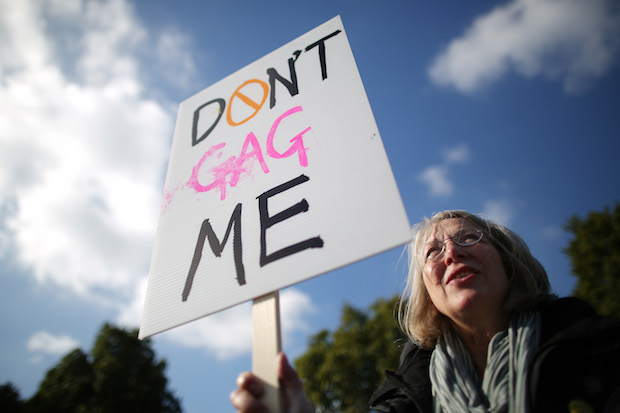Index on Censorship, once home to the most important defenders of free speech in Britain, is falling apart. Seventeen full-time staff members in place when Kirsty Hughes, a former European Commission bureaucrat, took over as chief executive in 2012 have been fired or resigned.
Among the recipients of redundancy notices are Padraig Reidy who was Index’s public face and its most thoughtful writer, and Michael Harris, who organised the lobbying to reform England’s repressive libel laws, the most successful free speech campaign since the fight to overturn the ban on Lady Chatterley’s Lover in the 1960s. The board, headed by David Aaronovitch of the Times and filled with Matthew Parris and other worthies – most of whom I should say I know and admire – has neither stopped the purge nor reversed Index’s new aversion to tough fights for human rights.
They fear that what once seemed almost an honorary post, may ruin them. Under its old CEO, John Kampfner, Index overextended its budget, not hugely but by enough. Charity law holds that trustees can be ‘personally liable for any debts or losses’ if their organisation goes bust. The Charity Commission says that ‘personal liability of this kind is very rare’. But in theory board members could lose their homes. Index’s failure to take out insurance to indemnify trustees against losses has only heightened the nervousness.
Fair enough, outsiders might say. You must make cuts to save an institution from bankruptcy. But Index’s staff volunteered to cover all the losses by taking a pay cut and working a four-day week. The Board rejected their self-sacrificing offer for fear of undermining their manager. (In Index, as in so many failed British institutions, the cult of the supreme manager, who must be protected and obeyed, stopped sensible compromises.)
Nor can financial constraints explain why the new managers have turned Index from a fearless campaign group into an organisation that emits windy platitudes and little else. ‘We’ve become a wonkish think tank rather than an organisation that fights for freedom,’ one staffer told me. ‘We never stick our neck out on the big issues now.’
Others criticised Hughes’s micro-management. I don’t know how seriously to take this, you can always get people to bitch about the boss. What is undeniable, however, is Index’s disgraceful treatment of writers suffering under dictatorial regimes abroad. Stephen Spender founded Index in 1972, in response to an appeal from writers in the old Soviet empire. Index is now abandoning their successors. Earlier this year, Hughes cut all funding for underground journalists in Belarus – Europe’s last dictatorship. Andrei Aliaksandrau, a Belarusian journalist based in London, who organised a programme to help opposition writers expose the dictatorship on the Web, is one of the many people walking away. Index’s behaviour appears particularly mean-spirited, as it did not even help Belarusian journalists from its own funds. It just managed an aid scheme. Now it has abandoned reporters, who relied on the programme Index organised. They can’t get jobs in the state media, because the secret police have blacklisted them, and the opposition press is too harried and impoverished to hire them.
The situation is as bad at home. My sources say Index could ‘never again’ repeat its campaign against the Azerbaijani dictatorship, or successes in stopping RBS selling Belarusian government bonds. ‘We have no capacity to take on 2014’s classic liberal issues: mass surveillance by the security services or the threat of state interference in the press after Leveson.’
I know from long and painful conversations that the world of free speech campaigning has become a little fraught of late. The Index board had to announce that Hughes had ‘resigned to write books’ after Ian Hislop, a patron of Index, said he would resign unless there were changes.
Aaronovitch tells me he’s spending every spare minute trying to sort out the mess. I hope he succeeds. Because, if he does not, British culture will suffer. If you watch the television news, you will and see that every time there’s a threat to free speech, a spokesman or woman from Index pops up to put the case for liberty. You may assume they are an efficient and well-financed lobby group. In reality, there are a tiny number of people in ramshackle offices desperately trying to cope with all the threats from the state, religious fanatics, the politically correct, business and Hacked Off. If they go, there’s no one to replace them.
And go they may. You cannot preside over a shambles like the Index fiasco and expect that no one will notice. Fritford, a Norwegian free speech foundation, has already cut its grants to Index. Other funders are noticing too that Index is an insipid imitation of its former self. To put it another way, David Aaronovitch and Matthew Parris may be reduced to selling the Big Issue outside Wapping station after all.







Comments